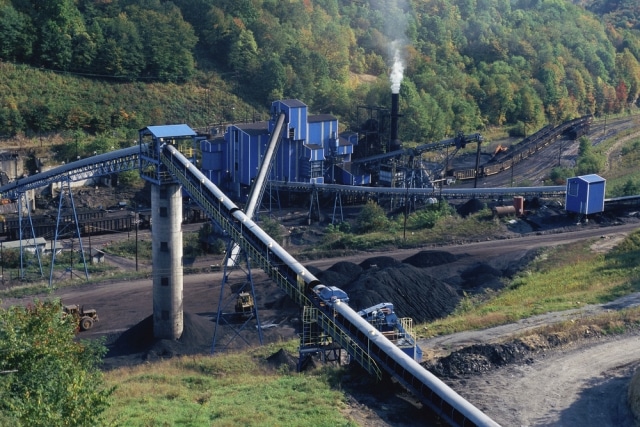Three years ago, 29 miners died at the Massey Energy Upper Big Branch mine. It was the worst mining disaster in decades, caused by a methane-fueled blast that was so strong it killed miners more than a mile away and left steel rail lines tangled.
Appalachia has seen its share of these sorts of accidents over the years and normally companies get fined, but mine operators almost never face criminal charges. This time was different.
For the past two years, the U.S. Attorney in West Virginia, R. Booth Goodwin II, has been systematically working his way up Massey’s hierarchy, arguing that beyond the managers who supervised that mine, there was a broader conspiracy led by still unnamed “directors, officers, and agents.” Goodwin has based his prosecutions on conspiracy charges rather than on violations of specific health and safety regulations, which means he can reach further up into the corporate structure. So far, he has convicted four employees including the Upper Big Branch mine superintendent who admitted he disabled a methane monitor and falsified mine records.
But in February, the case took a surprising turn. In pleading guilty to conspiracy charges, Dave Hughart, former President of a Massey subsidiary who is cooperating with the government, said that the person who had alerted him to impending mine inspections was Massey’s CEO, Don Blankenship – an accusation that sent a gasp through the entire coal industry.
Mine explosions have become increasingly rare in the U.S. as tighter federal oversight and better methane detection and ventilation systems were adopted. The disaster at the Upper Big Branch was labeled “entirely preventable” by the federal Mine Safety and Health Administration, which investigated the accident. Amid public pressure, Blankenship retired in 2010, losing control of the company he ran for 28 years. He walked away with a retirement package worth over $80 million and many felt justice was never done.
In late April, Goodwin filed papers saying his criminal investigation is not yet finished.
It is anyone’s guess whether Goodwin will actually bring criminal charges against Blankenship. But the case is best understood for what it says more generally about coal’s changing fate in West Virginia. It also highlights the epic career arc of this half century’s biggest coal baron.
Over the past two decades, Blankenship has had an unprecedented impact on every aspect of West Virginia – its economy, its courts, its media and its politics.
As the CEO of an energy company that at its height controlled over a third of the remaining coal seams in the region and had more mountaintop removal mines than any other Appalachian company, Don Blankenship wielded enormous influence over the state and its politics.
He ran Massey Energy like a private fiefdom. Many of the mine offices had DAD’S cups that, according to court documents, stood not for the old-time root beer but “Do As Don Says.” Company calendars listed the keystone events in both American and Massey history, noting for example that on December 28, Woodrow Wilson was born in 1856, and in 1984 there were “eleven shots fired into Don L. Blankenship’s office at Rawl Sales” during a historic strike.
Blankenship worked aggressively to make sure things went his way where state politics were concerned. He spent $3 million in 2004 electing a conservative state supreme court justice who later voted Massey’s way in a crucial case, saving Blankenship’s company $70 million. This case, Caperton v. A. T. Massey Coal Co., raised thorny questions that were ultimately taken to the U.S. Supreme Court.
Blankenship also dealt then-Governor Joe Manchin one of his most painful political setbacks, spending hundreds of thousands of dollars funding a campaign that successfully convinced voters to turn down a massive bond plan.
In beating a major strike in 1984-85, then pursuing over the next decades an adamantly anti-union policy, Blankenship is widely credited with having been the man who undercut the United Mine Workers in a state where this union had, for the past half century, held strong. Blankenship’s success in defeating the UMW led in part to his being named the new head of Massey five years later.
And yet, in the space of two short years, Blankenship has lost the empire he worked most of his life to build.
In the aftermath of the Upper Big Branch disaster, he was pushed into early retirement. His money is no longer courted to finance the state’s long-shot Republican candidates. Massey’s sale to Alpha Natural Resources was finalized in the summer of 2011.
Quietly, the proud son of West Virginia moved outside the state last year, now spending most of his time in Tennessee.
In implicating Massey’s CEO as the person for a decade had directed him to hide safety violations from inspectors, Hughart was the first person in the industry to strike out publicly against Blankenship–even if he didn’t dare say his name. Until now, many West Virginians have been afraid to speak out against Blankenship, fearful for their jobs, their teaching positions or their political office.
But Hughart’s words were the culmination of a process that had brought the state and its people to a turning point. Never before have the consequences of an accident been so severe that they forced the resignation of a three-decade chairman and the sale of the company. Never before has an official investigation into a mining disaster moved beyond the minutiae to examine a corporate culture that was an incubator for accidents. Never before has the U.S. attorney in a mining disaster systematically pursued the highest perpetrators of the tragedy, refusing to settle for a few wrist slaps at underlings.
Mr. Goodwin’s pursuit of the Upper Big Branch case comes at an especially transformative moment for the coal industry more generally. Coal has never been so embattled. At its height, coal provided more than 50 percent of America’s electricity. Now it’s about a third and lessening every year.
There are already tighter regulations on mercury emissions and new rules on the disposal of coal mine waste, all of which add to costs for coal companies. And West Virginia operators like the former Massey Energy must also compete with massive strip-mined operations in places like Montana which already mines three times as much coal as the Mountain State.
Things will likely get even tougher for the coal industry. Regulations on valley fills are pending, which could make mountaintop removal projects in Appalachia vastly more difficult for companies to pursue. Obama has called for an “all of the above” energy strategy that includes a reliance on “clean coal” – an idea that has been debunked repeatedly – but has also talked increasingly about the need to address climate change.
For Blankenship, the wane of the coal industry and its dwindling political sway could not come at a worse time. He now faces the possibility of criminal charges in a state where for decades, a prosecution of a coal baron would have been unthinkable.
Rumors are swirling that Blankenship could be indicted soon, possibly within the next couple of months. If so, a West Virginia jury could decide whether Blankenship, who so closely managed his company’s operations, will be held criminally responsible for the 29 deaths in the Upper Big Branch mine.
Blankenship has recently made a few attempts to re-enter the public eye. On his twitter account, which fell silent in 2010, he’s resumed posting about politics and mine safety. “MSHA is the problem, not the solution,” he wrote in March, referring to the Mine Safety and Health Administration. His personal website features an entire “Mine Safety” section, recently updated, where he rails about the agency. And he’s tied to a new site named “Save the Country,” where climate change deniers like Christopher Monckton are allowed to air their – broadly discredited – views.
In 2011, Blankenship incorporated a new coal company in Kentucky, The McCoy Coal Group, long before his two-year non-compete clause that was part of his Massey retirement deal expired. But that company never applied for a mining permit, and in November, just before the non-compete clause expired, Blankenship told the Wall Street Journal he didn’t “have much in the way of plans with coal.”
The Upper Big Branch disaster, and his possible prosection, continue to cast a long shadow over any designs by Blankenship at a come-back. “Most of the candidates don’t want contributions from me because it gets too much negative publicity,” he told the Wall Street Journal in November.
With or without Blankenship, the coal industry faces broad troubles.
Just ask Wall Street.
“Coal is a dead man walkin’,” Kevin Parker, global head of asset management and a member of the executive committee at Deutsche Bank said in 2011. “Banks won’t finance them. Insurance companies won’t insure them. The EPA is coming after them… . And the economics to make it clean don’t work.”
Image credit: Aerial view of a West Virginia Coal Mine via Shutterstock
Subscribe to our newsletter
Stay up to date with DeSmog news and alerts






